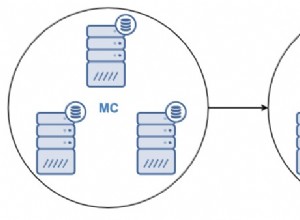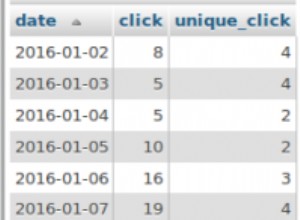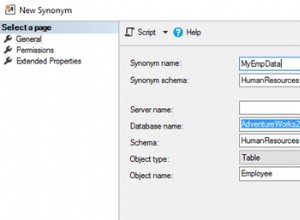आप GROUP_CONCAT का उपयोग करके प्रतिभागियों को जोड़ सकते हैं
SELECT
conf.conference_sid,
date_created,
TIMEDIFF(date_completed, date_created) AS duration,
conf.RecordURL,
conf.PIN,
GROUP_CONCAT(pid SEPARATOR ",") AS pid,
GROUP_CONCAT(call_sid SEPARATOR ",") AS call_sid,
GROUP_CONCAT(call_from SEPARATOR ",") AS call_from,
GROUP_CONCAT(name_recording SEPARATOR ",") AS name_recording
FROM
conference conf
LEFT OUTER JOIN
participants p ON p.conference_sid = conf.conference_sid
WHERE
conf.PIN = 123
GROUP BY conf.conference_sid
देखें SQLFIDDLE और MySQL प्रलेखन TIMEDIFF ।
अब एप्लीकेशन लॉजिक होगा
<?php
$pin = 123;
$db = new PDO('mysql:host=localhost;dbname=test', 'username', 'password');
$stmt = $db->prepare(
'SELECT
conf.conference_sid,
date_created,
timediff(date_completed, date_created) AS duration,
conf.RecordURL,
conf.PIN,
GROUP_CONCAT(pid SEPARATOR ",") AS pid,
GROUP_CONCAT(call_sid SEPARATOR ",") AS call_sid,
GROUP_CONCAT(call_from SEPARATOR ",") AS call_from,
GROUP_CONCAT(name_recording SEPARATOR ",") AS name_recording
FROM
conference conf
LEFT OUTER JOIN
participants p ON p.conference_sid = conf.conference_sid
WHERE
conf.PIN = :pin
GROUP BY conf.conference_sid');
$stmt->bindParam(':pin', $pin);
?>
<table border="1">
<thead>
<th>Date</th>
<th>Duration</th>
<th>Participants</th>
<th>Recording</th>
</thead>
<tbody>
<?php
$stmt->execute();
while ($row = $stmt->fetch()) {
?>
<tr>
<td><?php echo $row['date_created']; ?></td>
<td><?php echo $row['duration']; ?></td>
<td>
<table border="1">
<thead>
<th>call_sid</th>
<th>call_from</th>
<th>name_recording</th>
</thead>
<tbody>
<?php
$length = count(explode(',', $row['pid']));
$call_sid = explode(',', $row['call_sid']);
$call_from = explode(',', $row['call_from']);
$name_recording = explode(',', $row['name_recording']);
for ($i=0; $i < $length; $i++) {
?>
<tr>
<td> <?php echo $call_sid[$i]; ?> </td>
<td> <?php echo $call_from[$i]; ?></td>
<td> <?php echo $name_recording[$i]; ?> </td>
<tr>
<?php
}
?>
</tbody>
</table>
</td>
<td>
<a href="<?php echo $row['RecordURL']; ?>">
Call recording</a>
</td>
</tr>
<?php
}
?>
</tbody>
आपको pid, call_sid, call_from, और name_recording में अल्पविराम (,) से अलग किए गए मानों के साथ परिणाम सेट मिलेगा। आप explode का उपयोग करके इस स्ट्रिंग को सरणी में बदल सकते हैं .
array explode ( string $delimiter , string $string [, int $limit ] )




